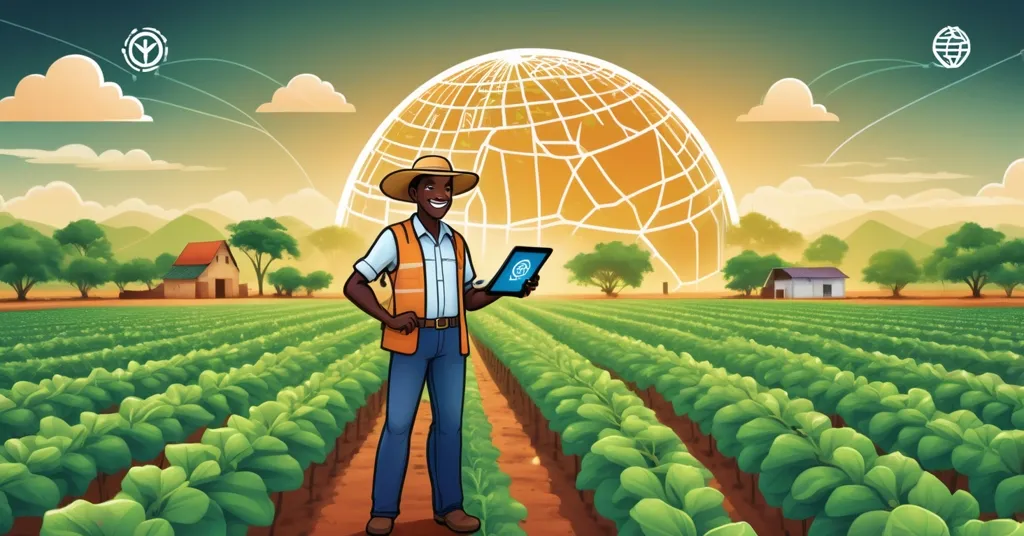AgriDex Executes First $165K On-Chain Farmland Deal on Solana

AgriDex Pioneers First On-Chain Farmland Deal on Solana Network
AgriDex has achieved a groundbreaking milestone by executing the first on-chain farmland transaction on the Solana blockchain, potentially transforming the global agricultural real estate market.
- First on-chain farmland transaction on Solana
- $165,000 land purchase in Zambia
- Instant, no-cost settlement
- Preparing for $2.6 million in additional deals
AgriDex, a platform built on the Solana blockchain, has successfully completed a $165,000 land purchase in Zambia, marking the first time a contract of farmland has been traded and settled directly on the blockchain. This transaction, which involved transferring payment from a buyer to Sustainable Agricultural Development in Mauritius, was settled instantly and at no cost using AgriDex’s digital settlement system. For those new to the crypto space, “on-chain” refers to transactions recorded directly on the blockchain, a secure, decentralized ledger of transactions.
Henry Duckworth, co-founder and CEO of AgriDex, highlighted the significance of this achievement, stating,
“For the first time, a contract of farmland has been traded and settled on the blockchain. This sets a precedent for improving how agricultural real estate is exchanged and financed.”
The agriculture sector, valued at a staggering $2.7 trillion (the total worth of all farming activities worldwide), faces numerous challenges such as slow settlements, high fees, and complex banking processes. AgriDex aims to tackle these inefficiencies by leveraging blockchain technology to reduce transaction costs and times, ultimately cutting out middlemen and enabling faster access to capital. This approach has already proven successful, with partners using AgriDex’s platform saving over $40 million per year in transaction-related costs.
AgriDex’s ambitions extend beyond farmland. The platform has previously facilitated transactions involving commodities like olive oil, wine, coffee, and livestock, demonstrating its versatility in the agricultural industry. With plans to process an additional $2.6 million in farmland deals, AgriDex is poised to further disrupt the sector and pave the way for a more efficient and accessible global agricultural trade system.
While this development is undoubtedly exciting, it’s crucial to approach it with a balanced perspective. Blockchain technology, while promising, is not without its challenges. Scalability, regulatory hurdles, and the need for widespread adoption are just a few of the obstacles AgriDex and similar initiatives will need to overcome. However, the potential benefits, such as increased transparency, reduced costs, and empowerment of small-scale farmers, make this a space worth watching closely.
Imagine a small farmer in Zambia who can now sell their land to a buyer in Europe without the hassle of banks and paperwork. Gone are the days of waiting weeks for a bank transfer to clear. With AgriDex, you can buy a farm faster than you can say ‘blockchain.’ This isn’t just playing in the fields; it’s revolutionizing them.
While AgriDex’s success on Solana is groundbreaking, it’s part of a larger movement towards decentralization and financial innovation. Solana’s high transaction speed and low fees make it an ideal platform for AgriDex’s instant, no-cost settlements. While Bitcoin remains the gold standard in the crypto world, the role of altcoins and other blockchains like Solana in filling unique niches cannot be overlooked. AgriDex’s use of Solana’s fast and low-cost infrastructure is a prime example of how different blockchain technologies can complement each other in the broader financial revolution.
Some critics argue that blockchain in agriculture is a solution looking for a problem, but AgriDex’s success tells a different story. The potential to empower small-scale farmers through parametric insurance and direct trade is a compelling narrative. However, entering new markets can be challenging due to entrenched interests and regulatory barriers. As AgriDex continues to grow, it will need to navigate these obstacles to scale its operations effectively.
The broader implications of blockchain in agriculture extend beyond transaction efficiency. AgriDex’s vision includes fostering more resilient and sustainable farming practices, which could revolutionize the global food system. The support of the crypto community will be crucial in driving this innovation forward.
Key Takeaways and Questions:
- What was the first on-chain farmland transaction completed by AgriDex?
AgriDex completed the first on-chain farmland transaction on the Solana network, involving a $165,000 land purchase in Zambia.
- How does AgriDex’s use of blockchain technology benefit agricultural transactions?
AgriDex’s use of blockchain technology allows for instant settlement of transactions at no cost, significantly reducing the time and cost associated with traditional bank transfers. This enables faster access to capital and cuts out middlemen, improving the efficiency of agricultural trade.
- What is the value of the agriculture sector that AgriDex aims to improve?
The agriculture sector is valued at $2.7 trillion, and AgriDex aims to address its inefficiencies such as slow settlements, high fees, and complex banking processes.
- How much are AgriDex’s partners saving annually through the platform?
AgriDex’s partners are collectively saving over $40 million per year in transaction-related costs.
- What types of commodities has AgriDex previously facilitated transactions for?
AgriDex has previously facilitated transactions involving commodities like olive oil, wine, coffee, and livestock.
- What is the significance of AgriDex’s latest transaction?
AgriDex’s latest transaction marks the first time a contract of farmland has been traded and settled on the blockchain, setting a precedent for improving how agricultural real estate is exchanged and financed.
As AgriDex continues to grow, will blockchain become the new norm in agricultural trade? The potential for a more efficient, transparent, and decentralized future in agriculture is not just a pipe dream but a tangible reality, thanks to initiatives like AgriDex.



